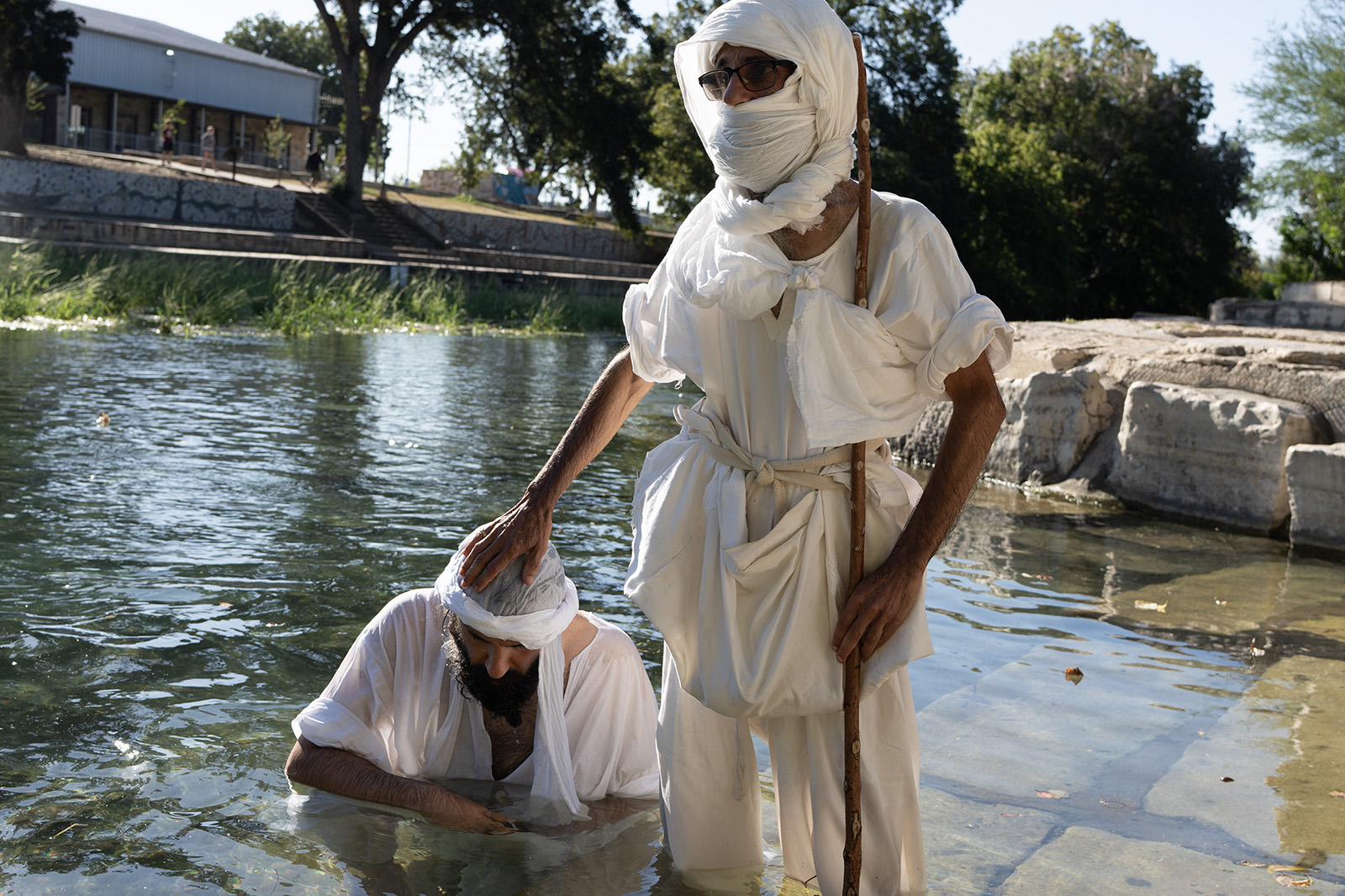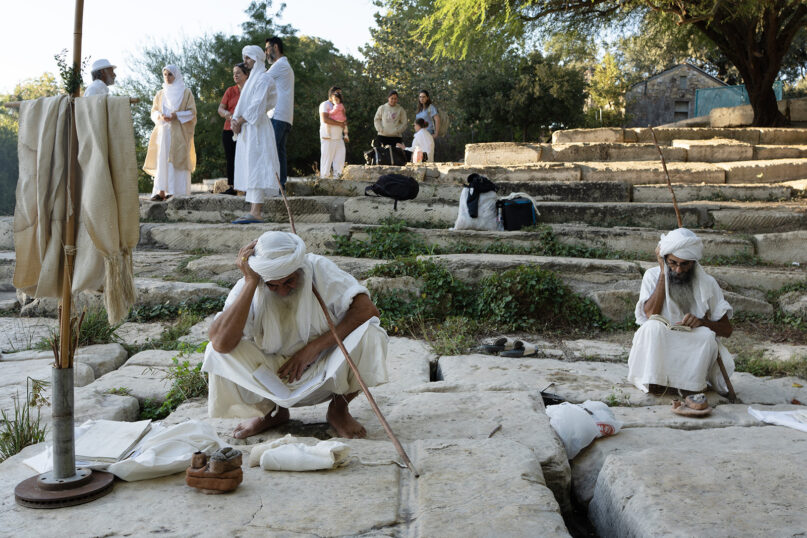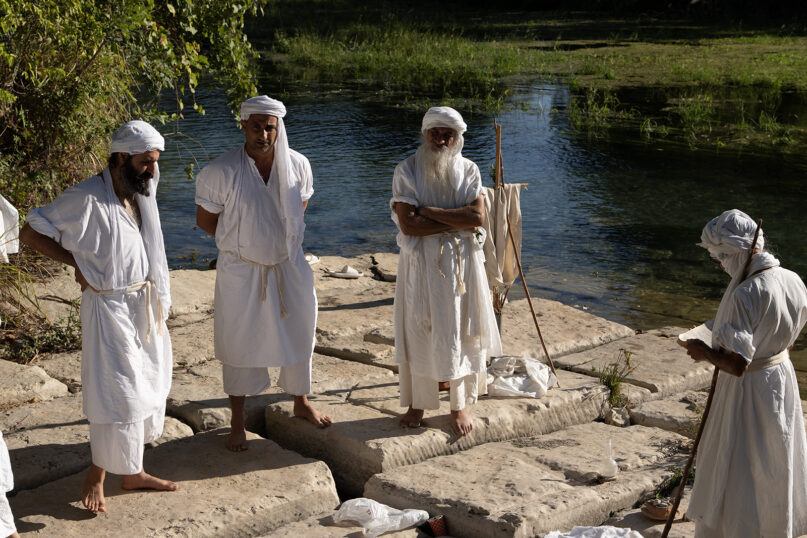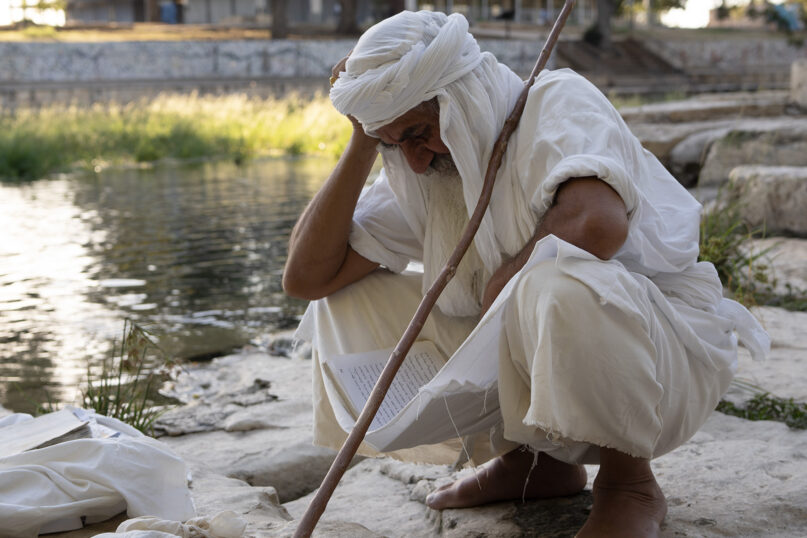
(RNS) — As the morning sun of Central Texas burned off the lingering crispness of a recent autumnal Sunday, Valid Ebadfardzadeh, an older man with a long white beard who was dressed in a stark white cotton turban and robe, lifted his hands in prayer.
To his right stood a bespectacled man with a salt-and-pepper beard, dressed in identical attire, with a golden ring on his pinky and a wooden staff resting against his shoulder. He stooped slightly, silently reading ancient words from a tattered book.
The two men are priests belonging to an ancient Middle Eastern sect known as the Mandaeans, one of the world’s smallest and least known religious groups. Consisting of about 60,000 members worldwide, Mandaeans are considered by scholars to be practitioners of the last surviving gnostic religion, a faith that may contain pre-Christian origins and reflects the swirling influences of Greek and Middle Eastern thought in the first century A.D.
Mandaeans believe they are descendants of the disciples of John the Baptist, the ascetic preacher who baptized Jesus Christ, according to the Christian tradition, and baptism remains their faith’s central ritual. Unlike Christians, however, the Mandaean religion requires practitioners to perform baptism, called the masbuta, every Sunday, often rebaptizing the already baptized, in flowing, fresh water.
The two priests had come to the edge of the San Marcos River near Texas State University, about 30 miles south of Austin, to administer the rite separately to groups of men and women.

Mandaean clerics Valid Ebadfardzadeh, left, and Bassam Fadhel Saqer, right, read religious texts in Mandaic, a dialect of Aramaic, before performing baptism ceremonies, Oct. 19, 2025, in San Marcos, Texas. (Photo by Ethan Housewright)
The Mandaean community in Texas is one of several that have fled religious persecution and the chaos of wars in the Middle East. Historically residents of Iraq and Iran, the Mandaeans have scattered around the globe. Those who found refuge in Texas’ Hill Country, between Austin and San Antonio, mostly fled discrimination in Iran. Some of the group say the Central Texas climate matches that of Ahvaz, the southwestern Iranian city in which many of Iran’s Mandaeans originate.
The bespectacled priest began baptizing a group of Mandaean men wearing traditional garments. One by one, each man entered the clear bluish-green water, kneeling before the priest. The priest bent, splashing water onto the participant’s head. He then scooped the water in his hand, raising it to the follower’s lips to drink.
Later in the ceremony, a Mandaean man entered the water holding a baby and sat down in a shallow area near where Ebadfardzadeh — a Ganzebra, or senior priest in the Mandaean tradition, who lives in Australia — was standing. Sprinkling water onto the child’s head, Ebadfardzadeh performed the baby’s first baptism — a sacred moment in the Mandaean faith.
“I love it. I feel great when I get baptized,” said Fares Abak, a 37-year-old San Antonio resident. Originally from Iran, Abak described a sense of freedom in his soul and a deeper connection to God, or the power of the universe, through the baptism ceremony. He compared the experience to the relief of taking a warm shower after a tough day at work.
Back in Iran, Abak explained, his father had tried to obtain a work permit from the Iranian government to run a jewelry business. The government repeatedly refused to grant the permit because of his religion, Abak said. “It was really hard. He had no business, no job for a long time,” Abak said. “We were suffering. We had no money, and we were eating maybe just one time a day.”

Mandaean senior priest Valid Ebadfardzadeh, center, prepares attendees for baptism ceremonies in the San Marcos River, Oct. 19, 2025, in San Marcos, Texas. (Photo by Ethan Housewright)
With help from the Jewish humanitarian organization HIAS, which assists refugees and asylum-seekers, Abak and his family migrated to Texas in 2014. “We’re happy that we live here. It’s a country that lets you live with freedom,” Abak said.
“We’re hoping one day, if everything turns good, maybe we can go back, live back there,” Abak said. “I grew up there, I had so many good friends.”
This baptism took place days before Dehwa Hanina, one of the four major feasts in the Mandaean tradition, observed on the 18th day of Taura, the fourth month of the Mandaean calendar. This year, the holiday fell on Oct. 31.
Meaning “Little Feast” in Mandaic, a dialect of Aramaic, Dehwa Hanina commemorates the creation of the world and the return of Hibil Ziwa — an angelic being identified as Gabriel in the Mandaean scriptures — from the underworlds to the worlds of light.
According to Mandaean tradition, Hibil Ziwa leaves the world of light at God’s behest and travels to defeat the evil entities inhabiting the worlds of darkness. Descending into the depths of the underworld, Hibil Ziwa subdues the forces of darkness and prepares the world for the creation of Adam, the first man.

Valid Ebadfardzadeh, a Ganzebra, or senior priest in the Mandaean tradition, reads a religious text near the San Marcos River before performing a baptism ceremony, Oct. 19, 2025, in San Marcos, Texas. (Photo by Ethan Housewright)
On Dehwa Hanina, Mandaeans traditionally serve dishes of rice and yogurt for breakfast on the morning of the holy day. San Antonio resident Sobhan Zahrooni said the simple meal reflects the simplicity of the world’s beginnings, when people survived on natural, agricultural foods such as milk. Leila Zahrooni, Sobhan’s wife, recalled visiting the homes of other Mandaean families on Dehwa Hanina, where rice and yogurt were offered as a welcome dish.
“You can think about it as, whatever was available,” she said. “People were farmers, what do they have on their land? It’s either wheat or rice. They had cattle. What does cattle have? Milk.”
She explained that even people of recent generations in Iran subsisted on dairy and rice because those foods were widely available. Each year, she makes the yogurt from scratch, preparing it a day before Dehwa Hanina.
Sobhan Zahrooni said Mandaean families also perform a special ceremony known as Dukhrani on the holy day, in which they prepare a memorial meal featuring grapes, almonds and pomegranate in honor of the dead. “In our family, he does it for my father, his father, his uncles, our people that passed years ago,” Leila said, referring to her husband. “So we just do it for them, and we pray over the food, and we say each of their names.”
Members of the community who have to work on Dehwa Hanina sometimes ask a tarmida — a Mandaean priest of the lowest rank — or someone else to perform the Dukhrani on behalf of their deceased relatives.
“I want to get baptized that day, but I’m working, so I won’t get it,” Leila said. “But hopefully the next holiday.”
